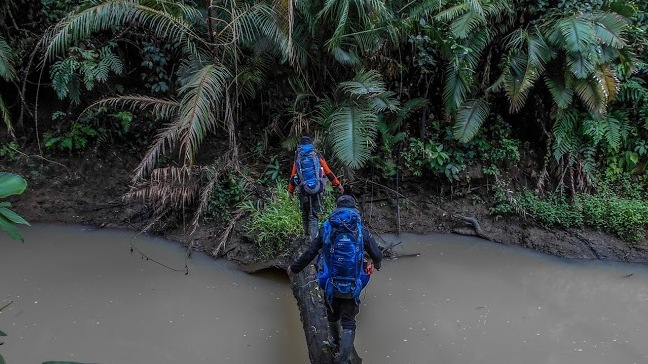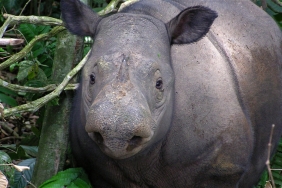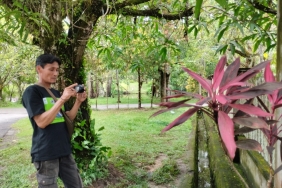THE FIGURE BEHIND THE RESCUE OF SUMATRAN RHINOS IN THE BUKIT BARISAN SELATAN NATIONAL PARK
Insect songs colored the team's journey this morning. In the distance, the sound of a siamang can be heard softly greeting us. From behind a grove of towering trees, the Rhinoceros Hornbill sang its melodious song. The rushing current of the Laay River behind us is still clearly audible. There is a peacefulness that pervades every time we step on the Bukit Barisan soil. This morning we will be installing camera traps in Balik Bukit Resort, Bukit Barisan Selatan National Park. Working as a WWF patrol team makes the WWF SMART Patrol team accustomed to going in and out of the forest, both for the purpose of collecting animal data and for securing forest areas from rampant illegal activities.
One of the WWF team members who has been doing this job since 2012 is Dedi Kurnia Putra. He is one of the figures behind the rescue of Sumatran rhinos in TNBBS. Born in 1989 in Tanjung Anom Kota Agung Timur, the area at the foot of Mount Tanggamus is the background of his attachment to nature. Living close to the forest since childhood made him feel close to nature. It was also what introduced him to WWF-Indonesia in 2012.
Starting from a curiosity to do activities in the Bukit Barisan Selatan National Park Forest, led Dedi to join WWF Indonesia as a field personnel. Initially, he joined the rhino survey team. From there, he became more interested in rhino and other wildlife conservation activities.
Some of the activities he did with the WWF team and National Park officers included installing camera traps, occupancy surveys, taking DNA samples of rhinos and elephants, and forest security patrols. These activities are carried out regularly every month using the SMART-based application.
Starting his career without sufficient experience and knowledge to work in the field of wildlife monitoring encouraged Dedi to continue learning and practicing his skills. One of the effective ways that he often practiced was "stealing" knowledge from experts, meaning that at every opportunity to work.
with experts, he will ask as much as possible, imitate and learn what he sees and feels. In addition, he participated in various rhino monitoring and survey trainings to improve his skills.
With this work, it is not uncommon for him to find many new things that are not experienced by many other people. He told me about his direct encounter with three tigers. Although from afar, it was quite thrilling. There was also a time when he saw a crocodile that was more than 5 meters long around Muara Canguk Way Haru. Another experience was when he was chased by a pig snake (Coelognathus flavolineatus) as big as an areca nut in Umbul Songo. One of his favorite things is when suddenly in the middle of a trip, he and his friends manage to find a waterfall or cave that makes him amazed at the natural beauty of the Creator's gift.
For Dedi, his work as a patrol team gradually grew his love and concern for forests and animals. Often while in the forest, he and his team encounter wildlife directly. This trained his instincts to be more sensitive to everything around him. He said that one time at the beginning of his participation with WWF, he met a group of hunters. Because he was wearing a patrol uniform, they immediately recognized him. Fortunately, he managed to escape from the poachers after a long debate and trying to trick them. But it wasn't just unpleasant experiences while on duty that he had. There were also many valuable experiences that gave him a sense of pride.
One of them was when the team managed to capture a video of a Sumatran rhino through a camera trap installed in 2012. This video is the first rhino documentation obtained by WWF in TNBBS after almost years of Sumatran rhinos rarely seen in the Bukit Barisan Selatan forest. The video is clear evidence of the existence of endangered animals that are rarely found in this area. This video is then a new hope for the future of Sumatran rhino conservation in Bukit Barisan Selatan National Park.
As time went by, his motivation to work in the field of conservation continued to grow with the hope that what he was doing would have a good impact on the preservation of Sumatran rhinos and their habitat in TNBBS. After working in monitoring Sumatran rhinos for almost 7 years, the challenges he encountered were not few. The rise of poaching and wildlife trade, the widespread practice of encroachment in the National Park area is a threat to the preservation of these animals. According to him, the practice of encroachment and illegal logging in conservation areas will be self-defeating because it will have an impact on environmental damage that causes erosion and other disasters. Instead of bringing benefits to one person, it will bring losses to many.
He added that his team's last encounter with a Sumatran rhino through a camera trap was in 2014. After that, WWF's camera traps never again captured the presence of this rare animal. Only occasionally did the team find traces in the form of footprints, feces, urine marks, and food marks suspected of rhinos.
Even so, Dedi believes that Sumatran rhinos still exist in TNBBS. It's just that rhinos are difficult to find. This is due to the behavior of the Sumatran rhino, which does not like areas with disturbances. It is also very sensitive to foreign odors, likes to live solitary, and elusive. According to him, the most important thing is how we always think positively so that we get the opportunity to rediscover Sumatran rhinos that have long been difficult to detect while continuing to protect their homes from illegal activities that threaten their sustainability so that these animals remain until the end of time.
Dedi advised that rhinos do not belong to just one party but to all so that in their conservation efforts we need to strengthen cooperation and embrace each other strongly. As a conservation worker who works directly in the field, he hopes that his struggle in the forest together with other team members can have an impact on the preservation of the National Park and become a good example for the next generation.





